Unit 1 My family always go somewhere interesting as soon as the holiday begins.教学课件
文档属性
| 名称 | Unit 1 My family always go somewhere interesting as soon as the holiday begins.教学课件 | 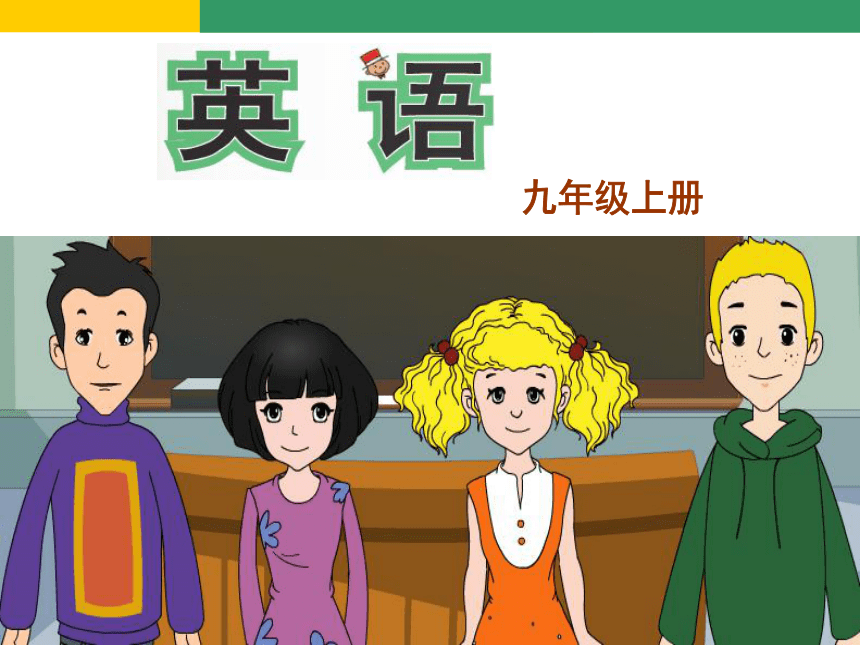 | |
| 格式 | zip | ||
| 文件大小 | 386.5KB | ||
| 资源类型 | 教案 | ||
| 版本资源 | 外研版 | ||
| 科目 | 英语 | ||
| 更新时间 | 2014-08-21 07:48:57 | ||
图片预览

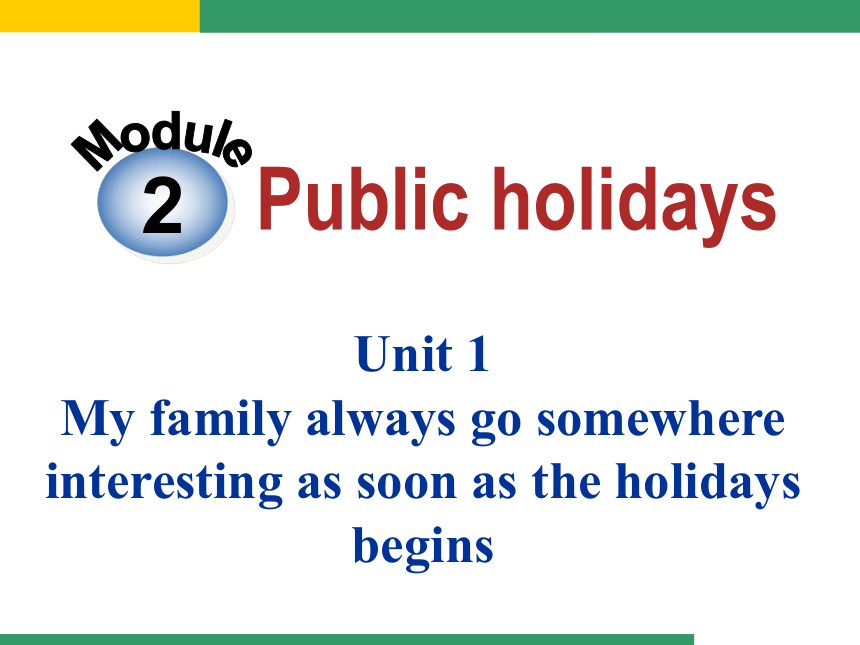
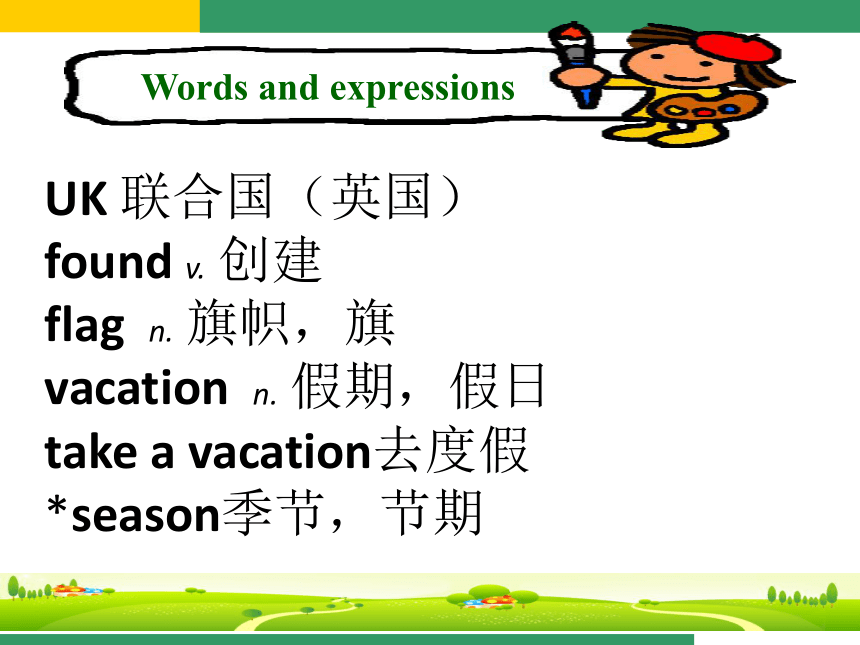
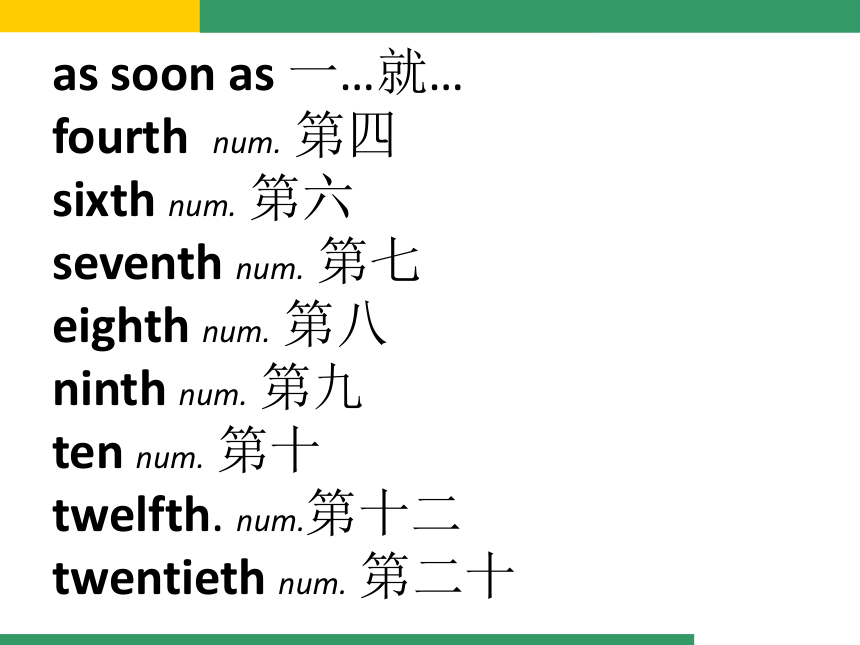
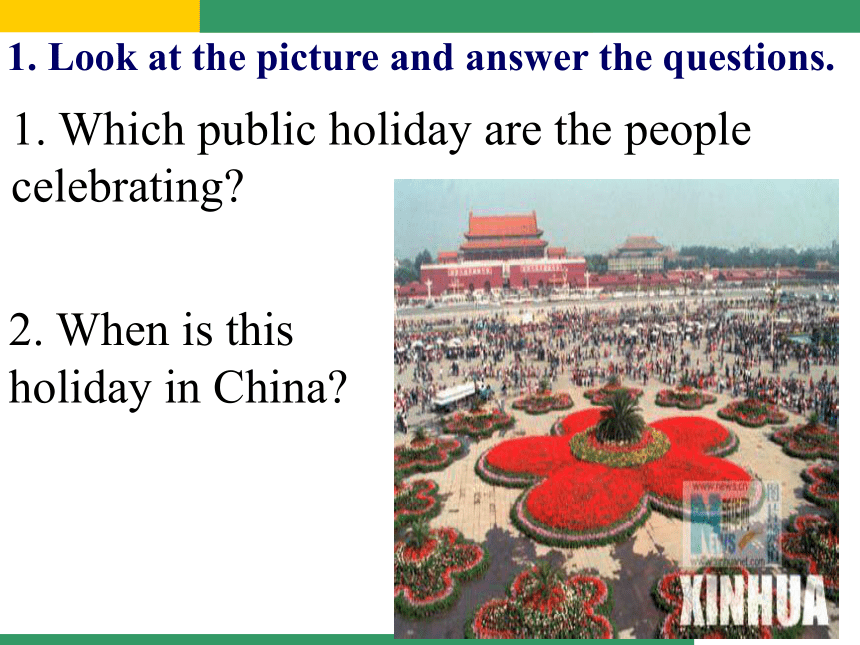
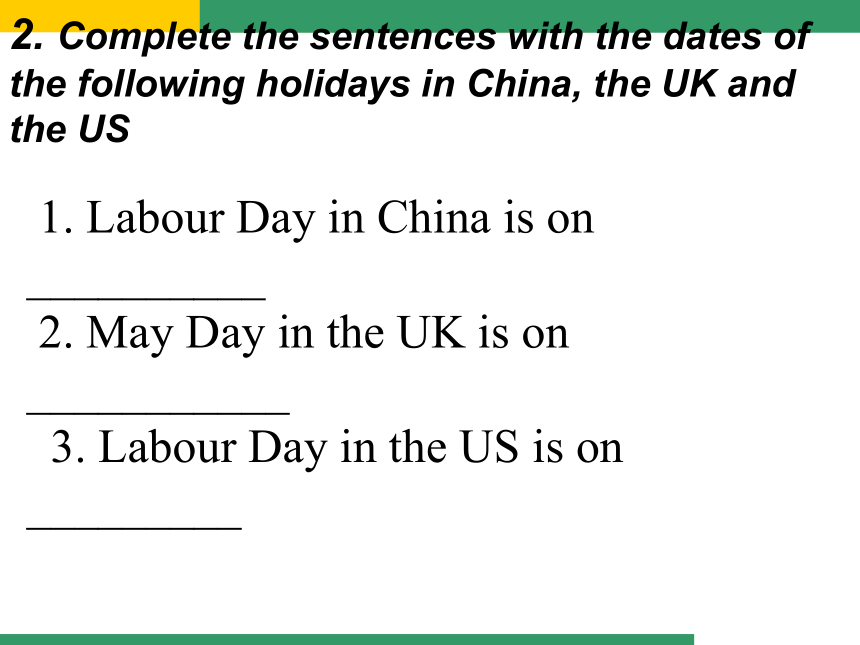
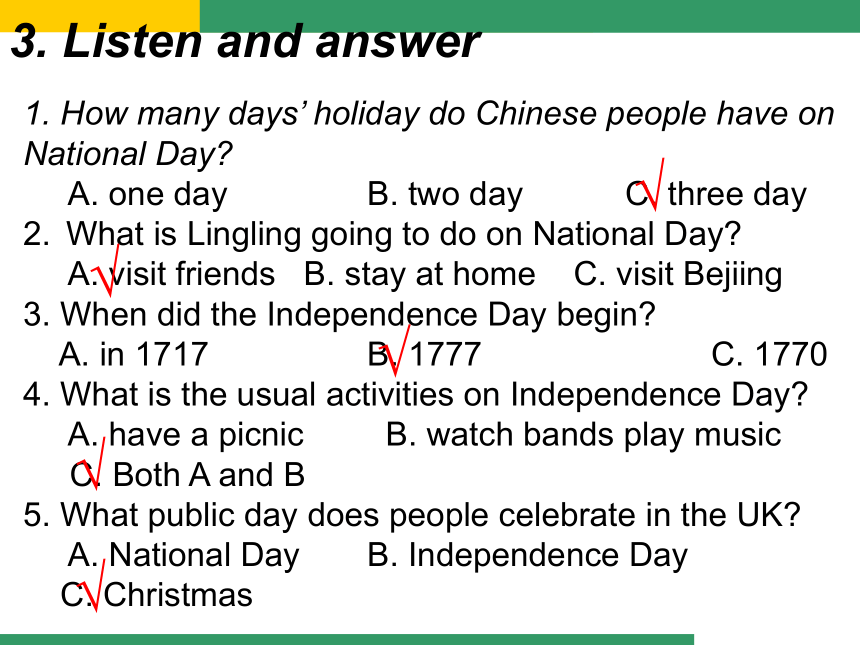
文档简介
课件16张PPT。九年级上册2Public holidaysModuleUnit 1
My family always go somewhere interesting as soon as the holidays beginsWords and expressionsUK 联合国(英国)
found v. 创建
flag n. 旗帜,旗
vacation n. 假期,假日
take a vacation去度假
*season季节,节期as soon as 一…就…
fourth num. 第四
sixth num. 第六
seventh num. 第七
eighth num. 第八
ninth num. 第九
ten num. 第十
twelfth. num.第十二
twentieth num. 第二十1. Look at the picture and answer the questions.1. Which public holiday are the people celebrating?2. When is this holiday in China?2. Complete the sentences with the dates of the following holidays in China, the UK and the US
1. Labour Day in China is on __________
2. May Day in the UK is on ___________
3. Labour Day in the US is on _________3. Listen and answer
1. How many days’ holiday do Chinese people have on National Day?
A. one day B. two day C. three day
What is Lingling going to do on National Day?
A. visit friends B. stay at home C. visit Bejiing
3. When did the Independence Day begin?
A. in 1717 B. 1777 C. 1770
4. What is the usual activities on Independence Day?
A. have a picnic B. watch bands play music
C. Both A and B
5. What public day does people celebrate in the UK?
A. National Day B. Independence Day
C. Christmas
√√√√√Read and complete the tableNational DayIndependence Day1st October4th July3 days1 dayflags and flwoers
everywhere
visited friendsflags everywhere
have picnic
watch band play music19491777Let’s read the dialogue Module 2 Unit 2 知识点the first 序数词前加the
China’s 中国的(名词所有格,表所属关系)Chinese 中国的,汉语,形容词
… , isn’t it? 反意疑问句,“前肯后否,前否后肯”。注意:陈述部分带有little, few, never, hardly, seldom等否定意义的词时,问句部分用肯定式。
The People Republic of China中华人民共和国
found(创建)-founded-founded,find(发现)-found-found1since then 自从那以后
everywhere 到处,处处
everywhere, somewhere, anywhere
everything, something, anything
everybody, somebody, anybody
a three-day holiday 一个三天的假期
a two-year-old boy
until 直到… … not… until… 直到… 才…
the end of … … 的结束
while 当……的时候Module 2 Unit 2 知识点2什么时候用when,什么时候用while?
1.主句:短暂动作 + when/while +从句:持续动作
He fell asleep when /while he was reading.?
I met him when /while I was taking a walk in the park.
2.主句:持续动作 + while +从句:持续动作 (同时进行),且主句动作延续到从句所指的整个时间
Don’t talk while you’re eating. ? I kept silent while he was writing.
3.主句:持续动作 + when +从句:短暂动作
When he came in, I was listening to the radio.
It was raining hard when we arrived.
4.主句:短暂动作 + when +从句:短暂动作
She stopped reading when I came in.Module 2 Unit 2 知识点3Independence Day 独立日
4th July 7月4日
have one day off 有一天的休息
all kinds of 各种各样的
the start of ……的开始
take a vacation 度假
sometime 某时 sometimes 有时 some time 一段时间 some times 几次
anything special somewhere nice / interesting 不定代词+形容词(形容词放在不定代词的后面)Module 2 Unit 2 知识点4have a picnic 举行野炊
have a great fun 玩得开心
watch sb do sth 看某人做某事(整个过程)watch sb. doing sth 看见某人正在做某事(事情正在发生)
as soon as 一……就……
as soon as 引导的时间状语从句
主句:一般将来时 + as soon as + 从句:一般现在时
I will tell him the news as soon as he comes back。
主句:一般过去时 + as soon as + 从句:一般过去时
He took out his English books as soon as he sat down Module 2 Unit 2 知识点5基数词到序数词的变化一二三单独记;八去 t,九除e,?ve要用f替,整十基变序,先把ty变成tie;要是遇到两位数,十位基数个位序,th最后加上去。
解析口诀:one → first,?two → second,?three →third 这三个词变化特殊,要单独记;eight →eighth,nine→ninth,?八去t,九去e后再加-th;?five→fifth,?twelve→twelfth,五、十二把ve换成f再加-th;twenty→twentieth,?thirty→thirtieth...?整十先把词尾y改为ie再加-th。两位数时则十位数用基数词,个位数用序数词,如:twenty-first。Module 2 Unit 2 知识点6
My family always go somewhere interesting as soon as the holidays beginsWords and expressionsUK 联合国(英国)
found v. 创建
flag n. 旗帜,旗
vacation n. 假期,假日
take a vacation去度假
*season季节,节期as soon as 一…就…
fourth num. 第四
sixth num. 第六
seventh num. 第七
eighth num. 第八
ninth num. 第九
ten num. 第十
twelfth. num.第十二
twentieth num. 第二十1. Look at the picture and answer the questions.1. Which public holiday are the people celebrating?2. When is this holiday in China?2. Complete the sentences with the dates of the following holidays in China, the UK and the US
1. Labour Day in China is on __________
2. May Day in the UK is on ___________
3. Labour Day in the US is on _________3. Listen and answer
1. How many days’ holiday do Chinese people have on National Day?
A. one day B. two day C. three day
What is Lingling going to do on National Day?
A. visit friends B. stay at home C. visit Bejiing
3. When did the Independence Day begin?
A. in 1717 B. 1777 C. 1770
4. What is the usual activities on Independence Day?
A. have a picnic B. watch bands play music
C. Both A and B
5. What public day does people celebrate in the UK?
A. National Day B. Independence Day
C. Christmas
√√√√√Read and complete the tableNational DayIndependence Day1st October4th July3 days1 dayflags and flwoers
everywhere
visited friendsflags everywhere
have picnic
watch band play music19491777Let’s read the dialogue Module 2 Unit 2 知识点the first 序数词前加the
China’s 中国的(名词所有格,表所属关系)Chinese 中国的,汉语,形容词
… , isn’t it? 反意疑问句,“前肯后否,前否后肯”。注意:陈述部分带有little, few, never, hardly, seldom等否定意义的词时,问句部分用肯定式。
The People Republic of China中华人民共和国
found(创建)-founded-founded,find(发现)-found-found1since then 自从那以后
everywhere 到处,处处
everywhere, somewhere, anywhere
everything, something, anything
everybody, somebody, anybody
a three-day holiday 一个三天的假期
a two-year-old boy
until 直到… … not… until… 直到… 才…
the end of … … 的结束
while 当……的时候Module 2 Unit 2 知识点2什么时候用when,什么时候用while?
1.主句:短暂动作 + when/while +从句:持续动作
He fell asleep when /while he was reading.?
I met him when /while I was taking a walk in the park.
2.主句:持续动作 + while +从句:持续动作 (同时进行),且主句动作延续到从句所指的整个时间
Don’t talk while you’re eating. ? I kept silent while he was writing.
3.主句:持续动作 + when +从句:短暂动作
When he came in, I was listening to the radio.
It was raining hard when we arrived.
4.主句:短暂动作 + when +从句:短暂动作
She stopped reading when I came in.Module 2 Unit 2 知识点3Independence Day 独立日
4th July 7月4日
have one day off 有一天的休息
all kinds of 各种各样的
the start of ……的开始
take a vacation 度假
sometime 某时 sometimes 有时 some time 一段时间 some times 几次
anything special somewhere nice / interesting 不定代词+形容词(形容词放在不定代词的后面)Module 2 Unit 2 知识点4have a picnic 举行野炊
have a great fun 玩得开心
watch sb do sth 看某人做某事(整个过程)watch sb. doing sth 看见某人正在做某事(事情正在发生)
as soon as 一……就……
as soon as 引导的时间状语从句
主句:一般将来时 + as soon as + 从句:一般现在时
I will tell him the news as soon as he comes back。
主句:一般过去时 + as soon as + 从句:一般过去时
He took out his English books as soon as he sat down Module 2 Unit 2 知识点5基数词到序数词的变化一二三单独记;八去 t,九除e,?ve要用f替,整十基变序,先把ty变成tie;要是遇到两位数,十位基数个位序,th最后加上去。
解析口诀:one → first,?two → second,?three →third 这三个词变化特殊,要单独记;eight →eighth,nine→ninth,?八去t,九去e后再加-th;?five→fifth,?twelve→twelfth,五、十二把ve换成f再加-th;twenty→twentieth,?thirty→thirtieth...?整十先把词尾y改为ie再加-th。两位数时则十位数用基数词,个位数用序数词,如:twenty-first。Module 2 Unit 2 知识点6
同课章节目录
- Module 1 Wonders of the world
- Unit 1 It's more than 2,000 years old.
- Unit 2 The Grand Canyon was not just big.
- Unit 3 Language in use
- Module 2 Public holidays
- Unit 1 My family always go somewhere interesting a
- Unit 2 We have celebrated the festival since the f
- Unit 3 Language in use
- Module 3 Heroes
- Unit 1 She trained hard,so she became a great play
- Unit 2There were few doctors, so he had to work ve
- Unit 3 Language in use
- Module 4 Home alone
- Unit 1 I can look after myself, although it won’t
- Unit 2 I became so bored with their orders that I
- Unit 3 Language in use
- Module 5 Museums
- Unit 1 Don't cross that rope!
- Unit 2 If you ever go to London, make sure you vis
- Unit 3 Language in use
- Module 6 Problems
- Unit 1 If I start after dinner, I'll finish it be
- Unit 2 If you tell him the truth now, you will sho
- Unit 3 Language in use
- Revision Module A
- Module 7 Great books
- Unit 1 We're still influenced by Confucius's idea
- Unit 2 It is still read and loved.
- Unit 3 Language in use
- Module 8 Sports life
- Unit 1 Daming wasn't chosen for the team last time
- Unit 2 He was invited to competitions around the w
- Unit 3 Language in use
- Module 9 Great inventions
- Unit 1 Will computers be used more than books in t
- Unit 2 Will books be replaced by the Internet?
- Unit 3 Language in use
- Module 10 Australia
- Unit 1 I have some photos that I took in Australia
- Unit 2 The game that they like most is Australian
- Unit 3 Language in use
- Module 11 Photos
- Unit 1 He's the boy who won the photo competition
- Unit 2 The photo which we liked best was taken by
- Unit 3 Language in use
- Module 12 Save our world
- Unit 1 If everyone starts to do something, the wor
- Unit 2 Repeat these three words daily: reduce, reu
- Unit 3 Language in use
- Revision Module B
